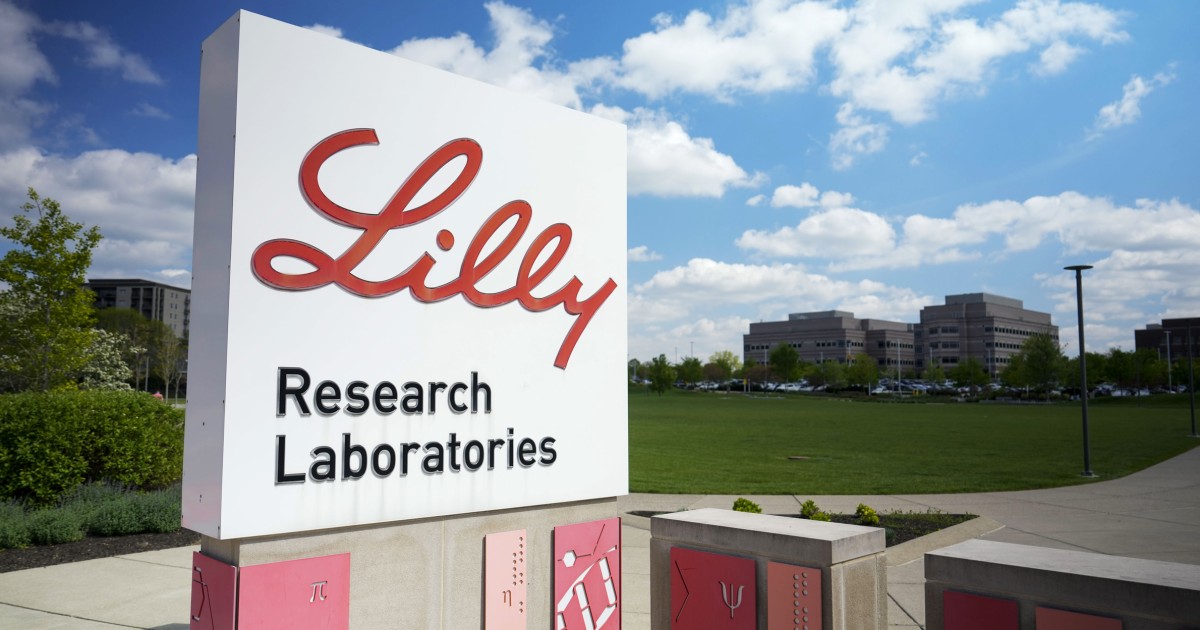A GLP-1 drug in pill form helped people with obesity lose 12% of their body weight — no needles required — pharmaceutical giant Eli Lilly announced on Thursday, August 7.
If approved by the U.S. Food and Drug Administration, it could be available by next year.
The medication, orforglipron, is in the same class of drugs as Mounjaro and Ozempic, which patients self-inject once a week. In contrast, the pill is taken once a day, and there are no food or water restrictions.
It may be more convenient or preferable for people who can’t stand needles or would just prefer to swallow a pill.
The weight loss shown in a late-stage trial of the pill is less than people can achieve with the injectable GLP-1 drugs, which can be 20% of body weight or more, NBC News medical contributor Dr. Natalie Azar said on TODAY.
But it’s still going to be an important tool in the toolbox, she added.
“The big message here is that this is a pill,” she noted. “I think this still is going to have a significant role.”
The results of a phase 3 clinical trial found that orforglipron, along with a healthy diet and exercise, led to “clinically meaningful weight loss” in people who were obese or overweight but didn’t have diabetes, Eli Lilly noted in a statement.
In June, the company said the drug also achieved both a reduction in A1C (a test used to measure blood sugar levels) and body weight compared to a placebo in adults with Type 2 diabetes. Its safety was also similar to other GLP-1 drugs. It’s the first drug of its kind to complete a phase 3 trial.
The drug mimics GLP-1, a hormone the body produces after eating, which can decrease appetite and help the body manage insulin production.
Does GLP-1 come in pill form?
Orforglipron is not yet approved by the FDA, but adults without Type 2 diabetes who took the highest dose of the pill for 72 weeks in a late-stage trial lost an average of 27 pounds, or 12.4% of their body weight, Eli Lilly announced.
That’s compared to a 2-pound weight loss for people on a placebo.
The drug was also linked with lower LDL cholesterol, triglycerides, systolic blood pressure and inflammation levels in the blood.
“Those are all really good things,” Azar said.
In people with Type 2 diabetes, the medication lowered A1C — which measures blood sugar levels over the past three months — by an average of 1.3% to 1.6% after 40 weeks compared to a placebo, according to the trial results, which were published in The New England Journal of Medicine on June 21.
Two-thirds of study participants who took the highest dose of orforglipron achieved an A1C of 6.5% or less, from a starting point of 8%, Eli Lilly noted.
This reduction means that “if a doctor tested them, they wouldn’t even know that they had diabetes anymore,” Dr. Dan Skovronsky, Eli Lilly’s chief scientific officer, told NBC’s Stephanie Gosk in an exclusive interview that aired on TODAY in April.
The reduction in A1C from the pill form “is comparable to what we see with injectable GLP-1 drugs like Ozempic, though perhaps slightly less than what’s seen with dual agonists like Mounjaro,” Dr. Christopher McGowan, a gastroenterologist in Cary, North Carolina, told NBC News. He was not involved in the trial.
Can you lose weight on a GLP-1 pill?
When it comes to weight loss compared to injectable GLP-1 medications, the pill “activates that GLP-1 receptor in your body,” Skovronsky said.
But the highest dose of Zepbound, Eli Lilly’s injectable GLP-1 drug approved for obesity management, leads to a 21% weight loss in adults without diabetes after 72 weeks, according to the company.
That’s almost double what the pill achieved. Still, a lot of people don’t want to take an injectable medication, said Dr. Shauna Levy, an obesity medicine physician and medical director of Tulane’s Bariatric and Weight Loss Center.
“So having an oral option just increases our ability to treat this disease,” she said on TODAY.
Bariatric surgery still achieves superior weight loss compared to GLP-1 drugs, a recent study found.
The pill is easier to make, so it could be more accessible than the injectables, which were often in short supply.
Eli Lilly says it’s already started manufacturing and stockpiling the pills so there’s an abundant supply once the drug gets FDA approval, NBC’s Stephanie Gosk reported.
It’s not known yet whether the pill option will cost less than the injectables, Azar said.
“It’s the only one on the market. They have no competition,” she noted.
What are the side effects of the GLP-1 pill?
The side effects of the pill were similar to injectable GLP-1 drugs, including gastrointestinal issues such as nausea, constipation, diarrhea and vomiting, the company noted.
No signs of liver damage were observed, Eli Lilly added.
About 10% of study participants who took the highest dose of the pill stopped treatment because of the side effects.
Taking a pill rather than having to self-inject a drug can be a game changer for some people, said Dr. Melanie Jay, an NYU Langone obesity researcher. But she cautions the prescription drugs need to be managed by a doctor no matter which form they come in.
“It is not a silver bullet, and we are finding that in real world practice, we still have so much to learn about how to use these medicines,” Jay said on TODAY.
